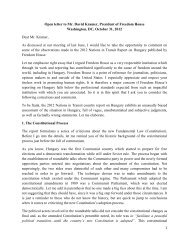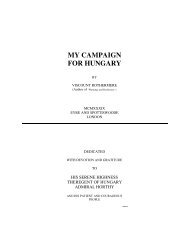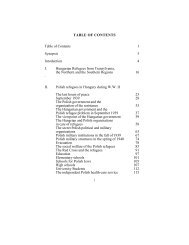The Fate of Western Hungary 1918-1921 - Corvinus Library ...
The Fate of Western Hungary 1918-1921 - Corvinus Library ...
The Fate of Western Hungary 1918-1921 - Corvinus Library ...
You also want an ePaper? Increase the reach of your titles
YUMPU automatically turns print PDFs into web optimized ePapers that Google loves.
Banate was declared to be Hungarian, all three languages were deemed to be<br />
acceptable in <strong>of</strong>ficial and private usage. As well, laws and regulations were<br />
prescribed to be published in all three languages. It was based on this that the<br />
organization for the setting up <strong>of</strong> the infrastructure <strong>of</strong> the new state was begun,<br />
which, unfortunately, lasted a mere month. However, it is a fact that the<br />
proclamation <strong>of</strong> Lajta-Banate speeded up the resolution <strong>of</strong> the <strong>Western</strong><br />
<strong>Hungary</strong> question.<br />
According to the terms <strong>of</strong> the Venice Protocol, the Hungarian government<br />
began to disarm the rebels in the second half <strong>of</strong> October, whom they sternly<br />
instructed to lay down their arms. “A separate notice was addressed to<br />
Hungarian functionaries and Hungarian <strong>of</strong>ficers who took part in the<br />
insurrection to return home or face court action. A proclamation was aimed at<br />
students <strong>of</strong> academies to return to their schools or face the loss <strong>of</strong> half <strong>of</strong> an<br />
academic year. <strong>The</strong> population was warned not to support the rebels with either<br />
money or arms, or face legal consequences. Finally, an appeal was made to the<br />
enlisted men, and others not part <strong>of</strong> the mentioned groups, mainly <strong>of</strong>ficers and<br />
non-commissioned <strong>of</strong>ficers, and other parties, to lay down the arms, otherwise<br />
face legal charges <strong>of</strong> insurrection.” 439 Former prime minister Friedrich was first<br />
to return permanently to Budapest; however, his unit came under the command<br />
<strong>of</strong> commander Prónay. Prime Minister Bethlen tried to convince the<br />
commander <strong>of</strong> the Lajta-Banate forces in a long October 17 letter that all<br />
further resistance was futile and continued fighting was especially dangerous<br />
for the results obtained in the Venice Protocol. In his reply two days later,<br />
Prónay attempted to bear out that he was in no position to comply with the<br />
government’s request.<br />
<strong>The</strong> Hungarian government finally conceded <strong>Western</strong> <strong>Hungary</strong>, in return for<br />
a plebiscite for Sopron and its surrounding area, which sealed the fate <strong>of</strong> Lajta-<br />
Banate. <strong>The</strong> second return attempt <strong>of</strong> Charles IV (October 20 to 24) 440 only<br />
temporarily disrupted the disarmament <strong>of</strong> the rebels active in Lajta-Banate and<br />
the government’s evacuation <strong>of</strong> <strong>Western</strong> <strong>Hungary</strong>. Gen. Árpád Guilleaume,<br />
commander <strong>of</strong> the Szombathely district, was assigned the execution <strong>of</strong> those<br />
two tasks. <strong>The</strong> district command counter-intelligence section only notified<br />
Governor Horthy and the Hungarian government at 04:30 on October 22 <strong>of</strong> the<br />
return <strong>of</strong> Charles IV and the prior events. Since Gen. Guilleaume did not want<br />
to swear allegiance to the king, Commissioner Sigray relieved him <strong>of</strong> his post<br />
in the afternoon <strong>of</strong> October 21. At a special session <strong>of</strong> the Cabinet the following<br />
morning, the decision was taken to relieve Commissioner Sigray <strong>of</strong> his position<br />
and replace him with Gen. Guilleaume. However, the influence <strong>of</strong> Charles IV<br />
was stronger in Szombathely and the commander <strong>of</strong> the military district, Gen.<br />
László Horváth had Gen. Guilleaume arrested. After the failure <strong>of</strong> the<br />
monarchists at Budaörs, Gen. Guilleaume resumed his post the same<br />
439 Ádám T., 1939, op. cit., pp. 81–82.<br />
440 To be covered in more detail in the next chapter.<br />
173
















